I think about narcissism a lot. It’s a phenomenon that I find fascinating if not painful. What intrigues me is how people become narcissistic and how systems (family, culture, workplace) can be narcissistic in nature.

It will be very clear to anyone in the field that I am in no way presenting as a professional on this topic. These are my understandings and observations thus far after having survived multiple past narcissistic relationships, while currently navigating narcissism in relationships, and during my exploration of narcissistic systems that aim to control, condition, manipulate, and enslave. The narcissism of which I write is the everyday variety that is hard to pinpoint, not the imminently dangerous and pathological sort.
What is narcissism?
Some may describe it as excessive selfishness. But in a world where “selfish” is used to criticize people learning to love and care for themselves, I find this definition lacking. There are many clinical terms, definitions, and lists of traits that you can reference elsewhere. Below is how it makes sense to me.
Narcissism develops in a person who is stuck in traumatic and/or dysfunctional childhood wounding which causes them, as an adult, to behave in un-empathetic, self-serving, and un-remorseful ways. Evidence of narcissism plays out strongly in personal and professional relationships. Children who grow up with narcissistic parents are often conditioned to become narcissists themselves or, conversely, empaths who tend to feel the feelings of others too readily.
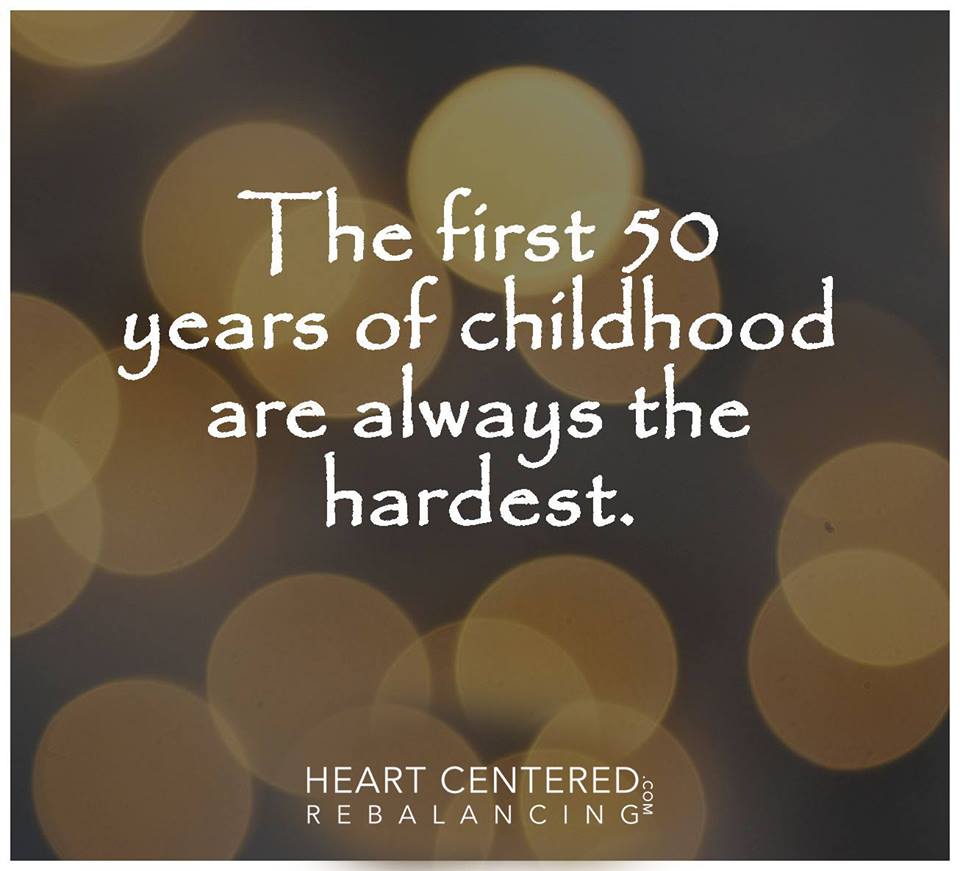
Sadly, empaths are considered in the modern culture an anomaly. Many empaths must learn safety skills (healthy boundary management) to manage their ability to feel with and for others. Being empathetic is a normal, natural human characteristic but because of a growing narcissistic population and culture, empaths have to learn how to carefully navigate contemporary life.
One can be overly empathetic which can handicap normal human interaction just as one can be overly selfish or narcissistic which can handicap normal relational interactions. The empath-narcissist relationship dynamic is of particular interest to me. One feels for others too much, the other feels for others too little and the combination can become a destructive and/or addictive relationship.
As children we are naturally narcissistic or egocentric. We are completely self-absorbed for survival. Imagine an infant restraining itself from crying out in hunger because mother is getting some much needed sleep. It doesn’t happen. Empathy begins developing as early as 18 months to two years, but most children do not show it fully until around age 4. (source)

As we grow into children and adolescents, the frontal lobes of our brain grow. The frontal lobes control the higher executive function of the brain, including empathy, perspective-taking (the ability to stand in someone else’s shoes), the ability to foresee logical consequences of one’s decisions and behaviors, planning, strategy formation, verbal & spatial memory, language, response inhibition, impulse control, and social behavior. The frontal lobes are not fully developed in humans until the mid-twenties. (source and source)
When a young person grows up with dysfunctional people and in systems that do not meet his/her fundamental and developmental needs, this person can become stuck in areas. There will be gaps in development that either remain and generate character defects or that will require an individual to revisit those gaps and facilitate retro-development. Most true narcissists are not open to therapy, so retro-development rarely happens. People who have had wounding and who have behaved selfishly are amenable to therapy and often do grow and mature into considerate adults. Selfish people feel remorse. Narcissists do not.
The Seven Irreducible Needs of Children (source)
1. The need for ongoing nurturing relationships: In the first three years of life, children need to have steady, warm relationships with at least one or two individuals. This is far more important than educational games and cognitive stimulation.
Children’s emotional growth precedes and is critical to their intellectual and moral growth. Parental choices about work and childcare need to be considered in the light of this need.
2. The need for physical protection, safety, and regulation: Children need assurance of their physical security and protection from all harm. This links with psychological security.
3. The need for experiences tailored to individual differences: By nurturing the nature of each unique child, parents help children reach their full potential.
4. The need for developmentally appropriate experiences: Parents must have realistic expectations for their children. Too much, or too little, or inappropriate stimulation for children’s age level or stage of development hinders the process of growing and learning.
5. The need for limit setting, structure, and expectations: Children have to be shown how to live positively with others and how to solve problems. Parents need to understand children’s weaknesses and empathize as they set clear limits.
6. The need for stable, supportive communities and cultural continuity: Children need to grow up in a stable environment that provides a continuity of values from family, peers, and the community at large.
7. The need to have their future protected: The authors point out that nations and society must commit to protecting these irreducible needs for all children, in our own country and in less developed parts of the world. Without this commitment, they argue, all children’s futures will be in jeopardy.
When children are raised by parents/guardians who do not have the ability or interest to provide for these needs, children grow into adults who are not fully formed psychologically, emotionally, and spiritually. Parenting is a lifetime responsibility. If there was a time you could not provide for your child/ren but you can now, there are ways to actively make it up to them.
Apologies, acknowledgement, and humility go a long way in healing wounds in your child/ren. Narcissistic parents rarely apologize, acknowledge short-comings, or feel humility in regards to their children. Instead they often tell their now adult children to “get over it” if the topic is brought up.
What are fundamental human needs?
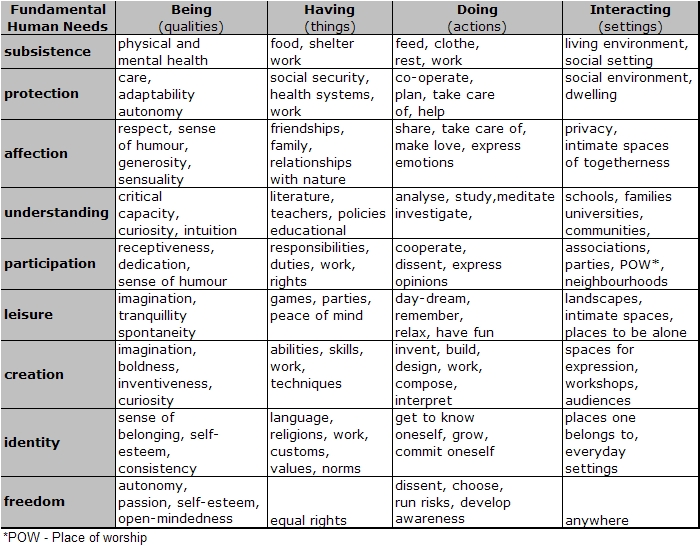
These needs were charted by Manfred Max-Neef and are considered few, finite, and classifiable compared to wants that are infinite and insatiable. (source)
When we think about our human needs and human wants, how we satisfy these, and how we involve others in obtaining them says a lot about where we fall on the narcissism spectrum.
As children we were fully dependent upon our parents/guardians to satisfy our needs. We were dependent upon adults who were willing to set aside their own needs (sleep) and many wants in order to satisfy our infantile needs (hunger). If we didn’t receive this type of treatment, dysfunction begins to formulate in the psyche.
As we age we become more able to satisfy our own needs and take care of ourselves. Ideally as young adults we have been taught and shown how to secure our needs and satisfy many of our wants without exploiting anyone else. By the time our frontal lobes are fully formed in our mid-twenties, our childhoods are behind us. What needs were not met are now our responsibility to bear or heal.
When we become adults dealing with other adults in love, work, and family, how we strive to fulfill our needs and wants tells a lot about where we are stuck or dysfunctional, if at all.
Herein Lies the Dysfunction
Adults who put their wants before others’ needs are narcissistic. Spending too much money on beer and not having enough food money for the family is narcissistic. Refusing to get therapy for your traumatized child because “what would the neighbors say about us” is narcissistic.

Adults who put their own needs before the adult needs of others are self-realized and have healthy boundaries. (There are times when your reserves are ample enough for you to extend yourself and jeopardize temporarily the meeting of your own needs for the sake of another.) Same goes for adults who put their wants before the adult wants of others.
Adults who put their needs before others wants are self-preserving. Going to bed early because you’re exhausted even though your friends want you to go out on the town for the evening is a sane, self-respecting, and self-nurturing choice. This is a healthy form of selfishness.
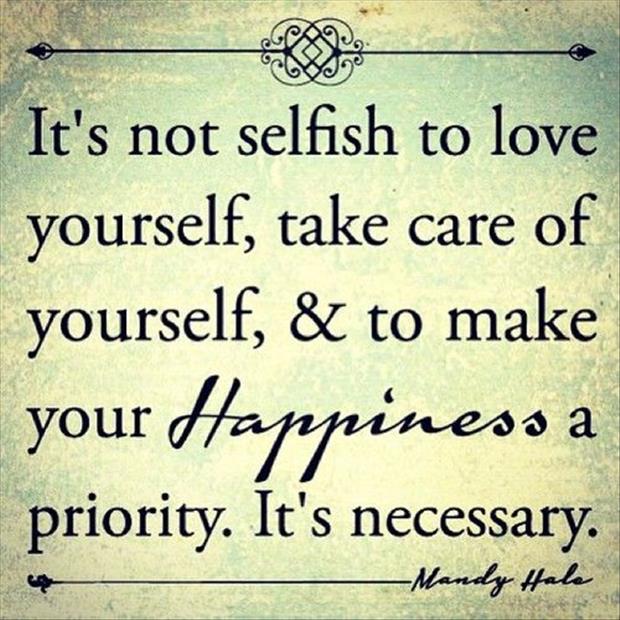
Adults who manipulate or coerce another into putting their wants and needs before his/her own wants and needs is a narcissist. A lover demanding that you drive him to the mall even though you’re already late for work is a narcissist. Allowing yourself to be manipulated into putting your needs aside (unable to say “no”) makes you the enabler of this narcissism. Volunteering to put your own wants and needs aside (and then usually complaining about it later) for the wants and needs of another adult makes you a co-dependent martyr.
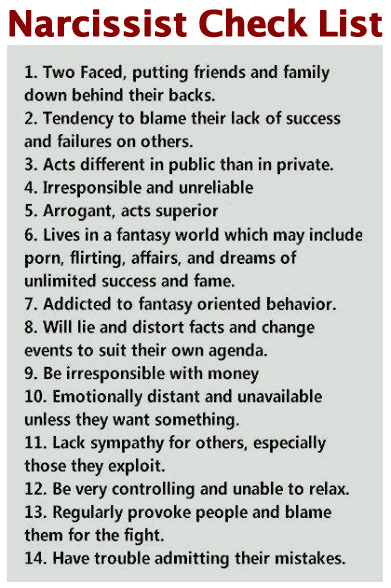
In adulthood we are each responsible for meeting our own needs. In close relationships we work out give-and-take exchanges to help each other mutually meet needs so that both people become interdependent – not fully independent nor fully dependent. Relationships with narcissists are generally more one-sided, exhibiting more take than give. Overt giving by a narcissist usually occurs only to reel back in their partner who is starting to separate.
Narcissists are more prone to addiction because instant-gratification and lack of impulse control (want) trumps delayed-gratification (satisfaction of needs). Addiction destruction and the impact it has on others is generally of little concern to the narcissist. Instead they will find ways to exploit your empathy so that you will enable or excuse their addiction.
Narcissists are also more prone to depression because when things don’t go their way, their world stops and they crumble. They lack resilience and humility. (This is not to say that all depressed people are narcissists.) Many people who are prone to depression thwart and overcome depression by reaching out to others who are in greater need. Being in service to others is an unnatural inclination for narcissists.
How to Outgrow and Avoid Narcissism
First, know the common traits. (source)
1. Shamelessness: Shame is the feeling that lurks beneath all unhealthy narcissism, and the inability to process shame in healthy ways.
2. Magical thinking: Narcissists see themselves as perfect, using distortion and illusion known as magical thinking. They also use projection to dump shame onto others.

3. Arrogance: A narcissist who is feeling deflated may re-inflate by diminishing, debasing, or degrading somebody else.
4. Envy: A narcissist may secure a sense of superiority in the face of another person’s ability by using contempt to minimize the other person.
5. Entitlement: Narcissists hold unreasonable expectations of particularly favorable treatment and automatic compliance because they consider themselves special. Failure to comply is considered an attack on their superiority, and the perpetrator is considered an “awkward” or “difficult” person. Defiance of their will is a narcissistic injury that can trigger narcissistic rage.
6. Exploitation: Can take many forms but always involves the exploitation of others without regard for their feelings or interests. Often the other is in a subservient position where resistance would be difficult or even impossible. Sometimes the subservience is not so much real as assumed.
7. Bad boundaries: Narcissists do not recognize that they have boundaries and that others are separate and are not extensions of themselves. Others either exist to meet their needs or may as well not exist at all. Those who provide narcissistic supply to the narcissist are treated as if they are part of the narcissist and are expected to live up to those expectations. In the mind of a narcissist, there is no boundary between self and other.
Sound like anyone you know?
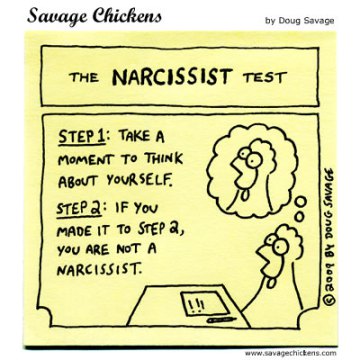
Healthy narcissism is a structural truthfulness of the self. It forms constant, realistic self-interest, mature goals and principles, and an ability to develop deep relationships. (source) Healthy people are not totally devoid of narcissism however rarely do their actions or words exploit & hurt others. If they do, healthy people are able to acknowledge their inappropriate selfishness & apologize.
Narcissist are not narcissistic in every single thing they do or say. That’s why pinpointing them is often so difficult. Sometimes they can be really nice. But if you wait long enough, often you will learn that their kindness is a manipulation.
I’ve been a sucker for narcissists. Through my experiences, I developed as an empath, often being called a “cry baby” because I was impacted so easily by the pain, anger, and fear of others. Quite often I was an enabler, unable to say “no” and stand up for myself. Once I learned how to be manipulated less, I cried & hurt less. I learned to manage my emotions appropriately and know which were mine to feel and which belonged to others. Learning to set boundaries and stop taking too much emotional responsibility for others helped me grow stronger. In new relationships I am appropriately empathetic and rarely lose myself in someone else’s drama.
When I am with narcissists who I’ve known for a long time, I feel that I can’t be myself. It is not safe. Truthfully I rarely get a word in edge-wise because most often we are talking about the narcissist or whatever interests the narcissist. In healthy relationships there is a give and take quality and a volley of conversation. There is dialogue, not monologue, like with narcissists. Often I feel that I’m walking on eggshells, afraid to say the wrong thing that will evoke criticism or speak my truthful mind and reveal my truthful heart. Being vulnerable to a narcissist is a dangerous place to be. It is exhausting being on high-alert around a narcissist. I think it’s easier just to avoid them when at all possible. If you can’t sever the relationship, minimize it.
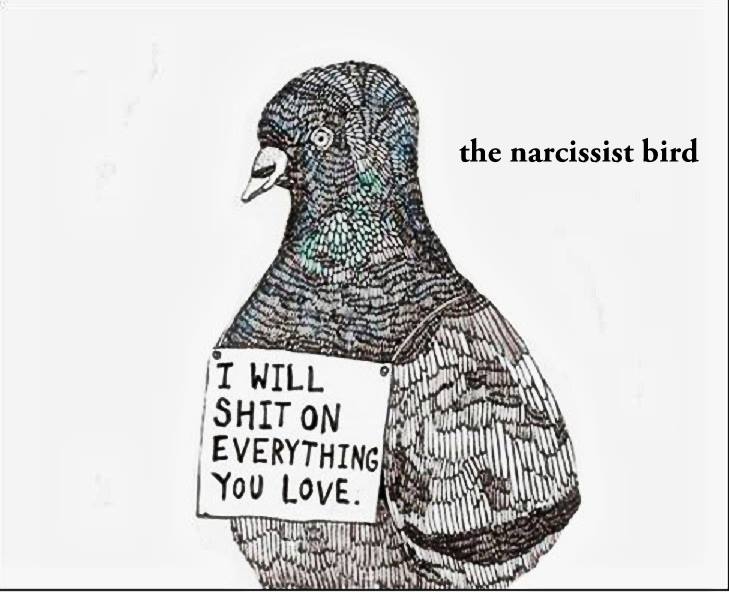
Unhooking from a narcissist can be very difficult. They will fight you, guilt you, tear you down (often so that they can build you up and appear to be your hero), ignore you, and shower you with gifts. There is no explaining to a narcissist your intent to leave. It will not register, it will make no sense, and it will only incite their narcissism. The only thing you can do is hold yourself together and walk away without explanation. Empaths in particular prefer to justify and explain all actions, but this will only work to your disadvantage with a narcissist. If you can’t walk away, minimize the relationship. The narcissist will probably & eventually lose interest in you all together when you stop serving their needs & wants.
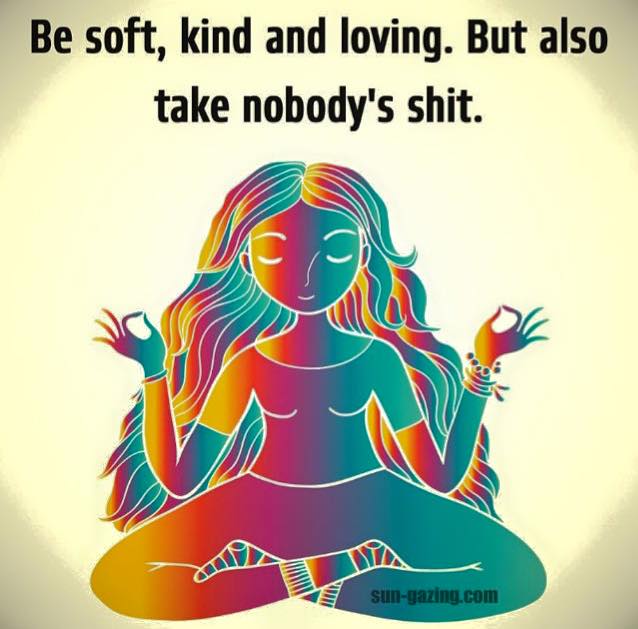
Empaths must learn to distinguish their own feelings from the tendency to feel a narcissist’s feelings for them, whereby excusing them of the duty. It requires practice. Sensing someone else’s developmental pain or trauma does not excuse their mistreatment of you. Establishing healthy boundaries, learning to say “no” to others, letting others be disappointed in you, and resisting the urge to explain yourself are skills that empaths must learn to survive intact when dealing with narcissists. It is possible and valid to feel empathy for another person from a safe and remote emotional distance. There is no law that requires you to act on & demonstrate your feelings of empathy. You don’t have to show or prove that you feel empathetic.
Narcissistic Systems
Narcissism is often a chain reaction. A spouse who is an enabler of an addict may turn around and be a narcissist in other family relationships. Narcissists are not necessarily narcissistic in all their relationships, only the ones in which they feel they can wield power, dominance, and control. When narcissism is the family theme (each man for himself), this behavior can pass through generations. Even with multiple narcissists, there is a hierarchy where one’s narcissism trumps another’s. Narcissists are often volatile & explosive with one another. Empaths don’t stand a chance in these systems. They get eaten up.
Living in families and cultures or working in places that are narcissistic in nature exploit humans, animals, and environments in pursuit of their wants. Little consideration is taken into account for how narcissistic actions, choices, and satisfaction of wants harm the lives of others and disrespect their needs of freedom, safety, and autonomy. These extremely selfish actions persist because narcissistic, un-empathetic people run the companies, organizations, and operations that place more value on excessive financial profit & power for themselves (wants) over justice for all (needs).
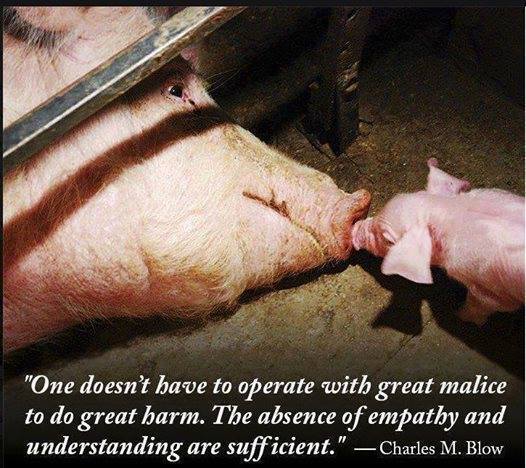
It is easier to leave or minimize a narcissist family system than it is to leave a narcissistic culture. Living in a cultural system that normalizes the exploitation of cheap labor, the pillaging of natural resources, the enslavement & abuse of non-human animals, and the inequality of citizens is unbearable to those who can stand in someone else’s place and feel their pain. The only thing that can be done is to activate & empower that pain to become action for justice. Campaigning for one’s own inalienable rights (reclaiming your power from family, relationships, culture) is the first step before campaigning for the inalienable rights of all people, all animals, and the one planet we all share. This is empathy in action. And this is how we unpack and dismantle systemic narcissism.
Additional Resources

{ 18 comments… read them below or add one }
Nail on the head! Thank you!
I will be sending the link to this article when needed in the future with a couple peeps in my life. Because it will be needed. 🙂
Glad you enjoyed the post, Jina! Thx for letting me know! PS – Sorry that you need it in your life. 😉
This has been up for a month and I only came across it today! Love it Carla… You hit the nail on the head here regarding narcissism in family systems, business, and culture.
I wish that our children were tested for where they stand on the scale of emotional development in kindergarten and then given the opportunity to grow properly, catching up if necessary.
Then it would be great to have courses taught from the early grades on up centering on this topic and how to establish healthy boundaries and healthy relationships.
I believe this would help to sove a multitude of problems, nipping tons in the bud.
I have studied researched everything I can on Narcissism for 2 years. You are correct Carla when you say it is so interesting and so very painful. I like your article.
I’m glad you liked it Bonnie. Thank you for reading & commenting!
“Narcissists are not necessarily narcissistic in all their relationships, only the ones in which they feel they can wield power, dominance, and control”
Does this statement mean that a person becomes narcissist in nature only with an empath or when they are in a relation with an empathic person??
To my knowledge a narcissist being a disordered person wants a need to control and dominate..so would they be comfortable being in a relation with a strong personality who can control a narcissist?
It’s been my experience with narcissists that I know that not everyone has trouble in relationship with them. They have friends who like them, which can seem unfathomable sometimes. Relationship dynamics and chemistry is so unique between two people and the right (or wrong) mix of power can make it a functional or dysfunctional relationship. I think people who have narcissistic tendencies feast on empaths. The chemistry of these two types together is wicked. I don’t think that a narcissist would want to be in a deep, intimate relationship with someone who is equally or more narcissistic than they are, but I could be wrong. Narcissists might be more narcissistic with some people and less with others depending on their unique chemistry and dynamics. If narcissists were awful people to everyone, they wouldn’t have anyone around them, however the opposite seems to be true as narcissists are often very charismatic.
In reference to this “Does this statement mean that a person becomes narcissist in nature only with an empath or when they are in a relation with an empathic person??”
it would be helpful to distinguish between:
– people who are so damaged they have a disordered exploitive personality(narcissists), -children raised by narcs who learned maladaptive narcissist social skills(can be narcs, but have intact empathy; they’re just codependent and dysfunctional and don’t know how to do anything differently)
-and people who use narc techniques to survive in toxic environments(situational narcs in corporations, third world barrios, xmas with a family of narcs).
Being raised by an adult child, who IMO was a narc, I learned inappropriate maladaptive ways of relating to people. I also know that, when I’d do something that got negative feedback, it bothered me. If it was something that hurt someone’s feelings, I felt bad and didn’t do it again. So just being raised with Narcs doesn’t automatically destroy empathy or turn one into a narc. But letting yourself stay around those people will keep you from learning better ways. I left all that crap as soon as I could (17) and never looked back. And even then it was a looooonnng road to learn proper social skills. You know how to make a good impression, but you don’t know how to sustain healthy boundaries/relationships.
” Narcissists might be more narcissistic with some people and less with others depending on their unique chemistry and dynamics”
It’s simple: If they can’t control someone and that person has power or influence the narc can’t dismiss, they will flatter them to be “in control”. I think that explains some of their apparently positive relationships with strong well adjusted people. They want to have control and access of these “high value social properties”.
Thank you for the additional insight! Interesting topic, for sure.
remember cold hands – cold heart – especially if you hear them say it
Wow….
You nailed this one😆
Thank you. Observations from real life. Sorry to know the subject well enough to write about it.
Absolutely, I’ve lived it also for 60 years and just discovering my true problems with my mother. It’s very hard to swallow and I feel betrayed. Therapy and hoping I’ll get better.
Dr. Karyl McBride is a great resource! https://www.willieverbegoodenough.com/
Best wishes!
The very scariest part of narcissism is that they appear so wonderful to everyone else, and often the most intuitive people are fooled by their persuasive nature leaving their victims to suffer the opinions of those that are fooled by them. Often the victims are told they are the problem, they are liars and acting like victims just for trying to bring light to the abuse and seek help. There has never been a scarier, lonelier, depressing time in my life. A living nightmare of sinister manipulative mind $&@;ing that sucks the absolute life out of a person. Thank you for writing this Carla, it’s a subject I plan to get very loud about as soon as I’m fully out of its grips…
And Melanie Tonia Evans on YouTube has a phenomenal program called quantum healing that is life changing.
I feel your pain and frustration Jenna. It is mind scrambling that narcissists aren’t necessarily narcissistic and destructive in all their relationships. It boggles my mind how narcissists can have any friends at all however it takes a perfect combination of two people (generally a narcissist and an empath) for the deep destruction to take place. Please don’t let it suck the life out of you, and know that you are not alone. Your situation is understood by many. When you are ready to fly free from the grips of narcissism, I and many others will celebrate with you. That time will come. Stay true to yourself and anticipate your liberation. In the meantime, minimize this relationship as much as you can. Stay well. Thank you for reading and taking the time to comment.
Hi Carla,
I think that learning that it is not selfish to prioritise my needs when they are really important is one of the hardest hurdles for children raised in narcissistic families. We grew up seeing our parent (or both parents) putting themselves first every single time, and that is inexorably associated with our pain as children. Nowadays when I am torn about prioritising myself I whisper “because you matter too.” It really helps 🙂
thanks for this excellent post,
Carla (Corelli)
Carla Corelli recently posted..Hypervigilance: Symptoms, Causes, and Treatment
Thank you Carla for your sharing insight and taking the time to read and comment. I think without careful, conscious parenting children can be taught/shown that their own needs are optional and can be ignored by others. When these same children grow into adults they struggle with taking up space and having actual physical and emotional needs (the business of being alive) that are valid. Yes, Carla, you matter too. I am glad you are learning this now. My best to you!
{ 3 trackbacks }